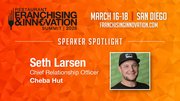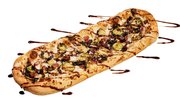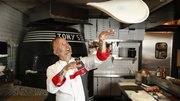Article
Panera CEO: There is no such thing as fast casual
The CEO talks about what makes Panera special and why his bakery café should not be lumped into the fast-casual segment.

November 15, 2006
Editor's note: Panera Bread has been in the news a lot lately. It recently purchased 51 percent of Paradise Bakery; it lost a lawsuit to Qdoba; and Fast Casual magazine named Paneraits brand of the year. This interview took place prior to those events.
At Panera Bread's 1,000th store opening, I'm working to land an interview with Ron Shaich, the chief executive of Panera Bread. The store, an end-cap unit dubbed the "G2" by Panera, is packed with about 200 associates, executives and franchisees.
They all know each other, and they all want their face time with Ron, who moves through crowds like a seasoned politician, shaking hands and asking about daughters and grandsons. I was nowhere on his radar, but that didn't stop me from bugging the heck out of Panera's PR person who was busy coordinating the event.
"I can get an interview, right, with Ron?" I ask Julie Somers, the PR director. My persistence is likely irritating by now. ... "I really need this interview."
-- Ron Shaich Panera CEO |
"I'll make it happen. Don't worry. He just wants to give a toast first," she said, kindly.
After the toast, Somers informs me Ron had to talk to somebody very important. So she smartly fills the empty time slot with a talk with Brian Lemek, owner of 32 Panera units in the Baltimore area. Lemek was indeed a good interviewee. But he wasn't the man of the hour.
When I finally met Ron, I was – first off – surprised by his wardrobe. Despite a lot of suits and sport jackets at the opening, Ron donned khaki slacks and a partially buttoned-up shirt. His casual dress, however, is no indicator of the serious businessman within.
Fast Casual: I'm looking at this store, this G2, and I'm wondering: Are you moving away from free-standing units?
Panera CEO: You speak to it as a prototype. There is no G2. We have a bunch of different iterations for whatever real estate allows.
Fast Casual: What's the square footage here?
Panera CEO: 4,200 maybe.
Fast Casual: OK. Tell me, then, what makes Panera special?
Panera CEO: Before I go into that, tell me, what were you doing before this?
Fast Casual: I was an Army journalist in Iraq, and before that, I was a sports writer.
Panera CEO: Really? That's very entrepreneurial of you.
Fast Casual: Back to Panera, I've always thought of Panera as very targeted toward women.
Panera CEO: I want to take you back for a second... . I don't believe there is such a thing as fast casual. I have never ever heard a customer say, 'I want to go to a fast-casual restaurant.' It's a creation of analysts and journalists. And the reality is that there are certain concepts that may share a common paradigm and a certain level of commitment to food of a certain quality and integrity. But there is not such a thing as fast casual.
Fast Casual: OK then. What is Panera Bread?
Panera CEO: We try to be the best place to come for soup, salad and sandwiches on the block. We haven't done anything different in 25 years.
Fast Casual: Who is your average customer?
Panera CEO: I don't think there is such a thing as average. I think there are niches. ... This concept has touched people all over the country. People get it. People really want to enjoy food they respect. They want to be served by people they respect. So it's not complicated. It's just hard to do.
Fast Casual: Well, Panera obviously has the formula you just described. You guys are constantly reporting solid comps. But away from the restaurant industry are analysts, who seem to be upset when you don't meet forecasts. How do you respond to analysts' criticism?
Panera CEO: We are not running this company for Wall Street. We are not running this company to drive the stock price. ... I don't even check the stock price daily.
What drives us is a constant delivery to consumers and what drives their needs. If we do that, we have high sales and high ROI. When we have high sales and high ROI, we have development. And when we have development, the stock grows. I can't drive the by-product. I spend my time with what drives our customers – the food. Having said that, anybody who has invested with us for the past 15 years has had an extraordinary experience.
Fast Casual: You mentioned development. In the past 15 years, many popular chains have grown too quickly. How have you kept the company from growing too fast?
Panera CEO: Because we have never been driven by growth. Growth is not the goal. Growth is a by-product of what we're trying to do. The minute you don't deliver to the consumer you adjust the growth rate. We're not here to grow; we're here to deliver a great experience. And when we do that, growth seems to come from the other side. Having said that, my senior guys have been with us for an average of 10 years. We've been through the worst together. We know that these kinds of concepts are so fragile and that our responsibility is to protect it. ... We want the best operators we can get. We joint venture. We don't do it for capital. We do it because we want local operating skill in local real estate. We want them thinking, 'How can I build equity over the long term?'
Fast Casual: Speaking of franchisees, this year you bought out a few franchisees. Are you buying underperforming operators?
Panera CEO: We always have bought franchisees. Every year, for half a decade, we buy out one or two. There's nothing material to it.
Fast Causal: Were they mutual buyouts?
Panera CEO: They're always mutual. We only have 40 (franchise) groups. Most of our groups are large, sophisticated foodservice companies that have local skills, local operations, local talent. And they're moving capital from lower return businesses to something like Panera. We will spend two years getting to know people before letting them sign a franchise agreement. We say, 'It's tougher to get a franchise with Panera than being a woman trying to get in Augusta National.'
Fast Casual: Let's move on to product sales. How has the Crispani Pizza done?
Panera CEO: We don't want to comment on the product domain.
Fast Casual: What do you think about all these other bakery cafés barking up your tree?
Panera CEO: The world doesn't need another Panera. Nobody's going to out "Panera" Panera. People need to figure out who they are and that's how businesses are built. ... finding your niche.
 ChatGPT
ChatGPT Grok
Grok Perplexity
Perplexity Claude
Claude












